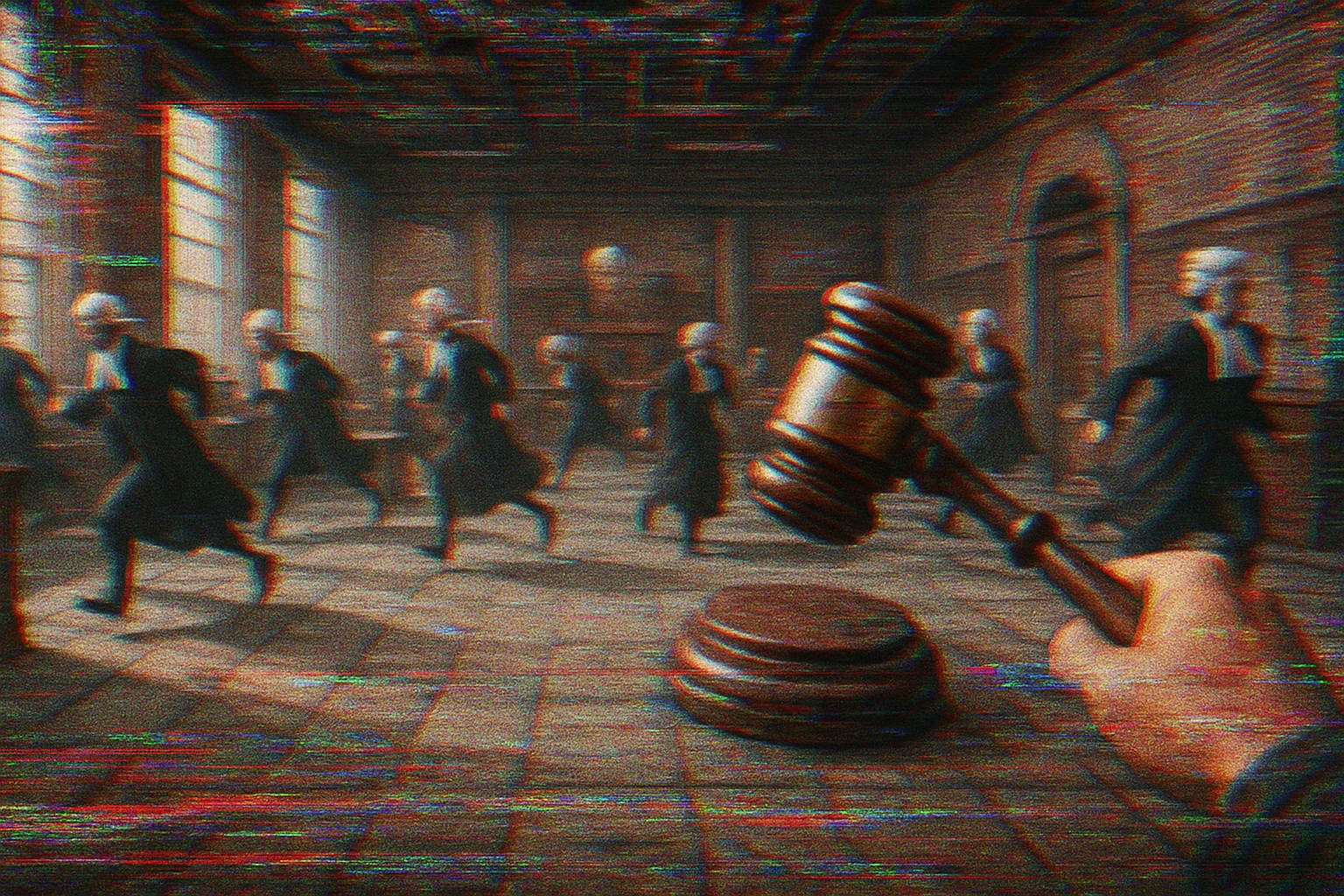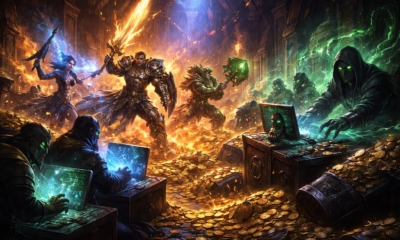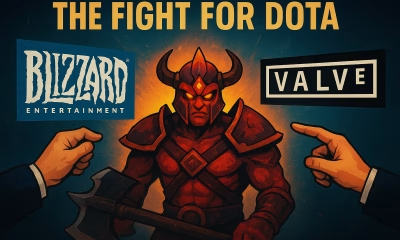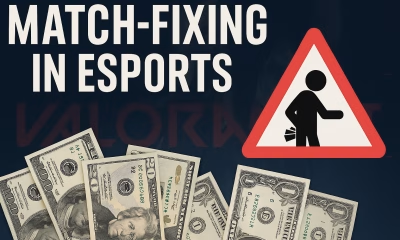Doping & Cheating
The Art of the Cheat: The Limits of Esports Regulations

Table of Contents
Introduction
Esports have evolved into a global phenomenon. Competitive gaming tournaments now fill arenas, draw millions of online viewers, and attract major investment from sponsors and media companies. Titles such as Apex Legends, Counter-Strike 2, and League of Legends are not only games but professional sports in their own right, supported by complex competitive structures and prize pools worth millions. Yet, one issue continues to shadow the industry: cheating.
From aimbots and wallhacks to hardware modifications and stream sniping, cheating threatens the foundation of competition. According to Esports Insider, cheating in multiplayer video games is more rampant in 2025, with Ubisoft reporting a 30% increase in detected cheating scandals since the launch of Rainbow Six Siege X.[1]
Respawn, developer of Apex Legends, has also confirmed an ongoing rise in AI-assisted exploits and external device manipulation in ranked play. Developers rely on contractual terms, privacy policies, and technical systems to enforce fairness, often acting both as lawmakers and judges within their ecosystems.
Private Governance and Self-Regulation in Esports
Unlike traditional sports, esports have no universal regulator. Each game is privately owned, and the publisher acts as the ultimate authority, defining rules, adjudicating disputes, and enforcing penalties. Apex Legends is governed by Respawn Entertainment, Valorant by Riot Games, and Counter-Strike 2 by Valve. Each publisher’s terms of service, tournament rulebooks, and anti-cheat systems operate as self-contained governance structures, forming a quasi-internal legal system within the game environment.
The differences between publishers’ systems as significant. Valve’s Anti-Cheat (VAC) system automatically bans accounts running unauthorised software, yet evidence of these bans is rarely disclosed publicly.[2] Riot’s Vanguard software operates at the kernel level, monitoring a player’s system continuously to detect cheats, even outside active gameplay.[3] Ubisoft uses similar detection mechanisms for Rainbow Six Siege, combining software monitoring with manual review, while Nintendo manually enforces bans for tampering in Pokémon. These examples demonstrate that while publishers can respond quickly to cheating, the lack of external review can make their decisions seem inconsistent or unfair.
Players participating in esports are more concerned with private contracts than statutory law. These agreements define cheating broadly and give publishers broad authority to enforce rules. Appeals processes exist but are internal, discretionary, and often slow, requiring significant time and effort to restore accounts or overturn bans. For instance, in 2018, at the International Dota 2 tournament, a Peruvian team was disqualified due to a teammate using a programmed mouse that had preset instructions for the player’s character, which constitutes cheating for the tournament organisers.[4]
The Esports Integrity Commission (ESIC), founded in 2015, provides anti-cheat and anti-corruption codes used by several tournament organisers.[5] However, compliance remains voluntary. Some publishers, like Valve, cooperate occasionally, while others, like Riot, prefer to enforce rules internally. Private regulation allows esports to operate efficiently and adapt to new cheating methods. Meanwhile, it concentrates authority in the hands of publishers, raising concerns about fairness, accountability, and consistency. Decisions that affect professional careers and sponsorships depend entirely on the publisher’s discretion. Without standardised procedures or independent review, enforcement can seem arbitrary, even when companies act in good faith.
Hence, private governance is a key strength of esports, allowing rapid growth and flexible enforcement. However, the lack of independent oversight and uniform procedures introduces risks to competitive integrity and player trust. Addressing these gaps will be essential as esports becomes more professional and high-stakes. Publishers effectively act as legislators and regulators within their own digital jurisdictions; however, a situation that works commercially but struggles to meet the standards of procedural justice found under standardised governance.
Legal and Regulatory Challenges
The foundation of esports governance lies in ownership, which gives game publishers broad authority over how competition is structured and enforced. Every competitive title is privately owned intellectual property, and this ownership gives publishers control over how their games are played, streamed, and modified. Rules on cheating and tournaments are usually embedded in the terms of service or competition rulebooks that players accept, often with a single click. These are not public laws, but private contracts.
A clear example comes from the Apex Legends Global Series Rulebook. Its official rulebook defines cheating as “any form of unfair play, including hardware tampering, network manipulation, or unauthorised software.”[6] Sanctions can range from temporary suspension to permanent exclusion from both the game and any affiliated tournaments. These are not contractual remedies, meaning that enforcement relies on the private terms players have agreed to, rather than on statutory consumer protections.
The private system works efficiently until disputes arise. Publishers act as rule-makers, investigators, and judges, leaving players with few options to challenge bans. There have been several cases where players were banned by automated systems or anti-cheat errors, later reinstated only after public attention forced a review. Without independent appeals or transparent reasoning, the process risks appearing arbitrary, a serious issue when a professional player’s livelihood is on the line.
In Europe, this gap between private enforcement and public accountability is beginning to close through the Digital Service Act (DSA). Article 21 of the DSA establishes a right for users to challenge account suspensions or removals before certified independent dispute settlement bodies.[7] If extended to esports, such a mechanism could offer players a transparent and impartial process to contest bans or disciplinary actions that are currently decided entirely by publishers. The DSA framework represents an important step toward oversight in a space where livelihoods depend on fair access to platforms and tournaments.
Modern anti-cheating systems also raise complex privacy questions. Valve’s Anti-Cheat system collects hardware and software identifiers to detect repeat offenders.[8] While these tools are effective deterrents, they rely on extensive data collection that sits uncomfortably against privacy laws like the UK GDPR. Regulators require that any processing of personal data be transparent, necessary, and proportionate. As PC Gamer noted, even well-intentioned anti-cheat systems risk crossing into overreach when players have little visibility into what data is collected or how it’s stored.[9]
Match-fixing and betting manipulation have repeatedly surfaced in gaming like Counter-Strike 2 and Dota 2, where competitive pressure and gambling incentives collide. The ESIC has conducted multiple investigations into the use of illegal spectator bugs.[10] Yet, despite the severity of these actions, few cases have led to criminal prosecution. Unlike traditional sports, where fixing can breach betting laws or fraud statutes, esports offences often fall into legal grey areas. Enforcement remains mostly contractual, with tournament bans or revoked prize money, which handle immediate integrity concerns but offer limited deterrence.
In essence, the law has not yet caught up with the realities of competitive gaming. Publishers wield immense power through ownership and contract, but the absence of external oversight or appeal mechanisms leaves fairness dependent on the goodwill of private companies. As esports becomes more lucrative, these gaps between contract law, privacy rights, and sporting integrity will only become more difficult to ignore.
Reform and Future Directions
As esports continues to professionalise, the calls for clearer regulation and robust governance are growing. The first step is to strengthen recognised industry standards so that self-regulation is more consistent and accountable. The ESIC already provides a common code of conduct and investigative framework. Requiring major tournament platforms and organisers to adopt ESIC integrity codes as a condition for hosting events would bring greater uniformity in investigatory procedures, sanctions, and appeals, without substituting state control for industry practice. Gamercraft’s decision to adopt ESIC’s Integrity Codes and become a Platform Tournament Organiser member illustrates how platforms can embed shared standards into their terms of service and tournament rules.[11]
Legal clarification is another essential pillar of reform. Existing consumer protection and data protection regimes can be adapted to work for esports, but may require tailored guidance or a shift in enforcement emphasis. Anti-cheat tools that operate at a deep system level raise legitimate privacy concerns; for example, reporting and commentary in the press about kernel-level anti-cheat systems have prompted debates about proportionality and transparency.[12] Regulators could issue sector-specific guidance on what monitoring is necessary and how players must be informed when intrusive detection systems are used, so that integrity measures do not override fundamental data protection rights.
The third area of reform lies in international cooperation. Esports are inherently global, with players, organisers, and servers regularly spanning multiple jurisdictions. Effective governance, therefore, requires mechanisms that transcend national boundaries. The IGET represents an important step in this direction.[13] By promoting collaboration among regulators, tournament organisers, and industry stakeholders, IGET offers a framework for ensuring integrity and accountability in an increasingly borderless digital environment.[14] These initiatives illustrate how international cooperation can strengthen enforcement, enhance access to neutral expertise, and align legal standards in the global esports industry. These arrangements can improve access to neutral expertise, help coordinate multi-jurisdiction investigations, and make sanctions more meaningful across events.
South Korea offers perhaps the clearest example of how structured oversight can co-exist with industry freedom. The Korean Esports Association (KeSpa), established with government backing and linked to the Korean Olympic Committee, has been instrumental in giving esports official recognition as a legitimate sports discipline.[15] Through its licensing system for professional players, standardised tournament regulations, and long-standing anti-match-fixing initiatives, the Korean Esports Association has created a transparent ecosystem that balances competition integrity with commercial growth. While its model reflects South Korea’s unique gaming culture and strong state involvement, it demonstrates that meaningful public recognition can strengthen industry development when regulatory and publishers work in tandem.
The reforms must protect players’ rights. Integrity systems should include independent review or arbitration, transparent evidential standards, and proportionate sanctions. Data collection for anti-cheat purposes should follow clear policies of necessity and transparency. Above all, industry should choose accountability over convenience. Private regulation has taken esports a long way, but sustainable fairness will require binding standards, a coordinated enforcement mechanism that gives players meaningful recourse.
Conclusion
Esports have grown into one of the most dynamic and commercially powerful forms of entertainment in the world. Yet, while the industry has advanced at a remarkable pace, the systems designed to protect its fairness have not kept up. Decisions about cheating bans, player suspensions, or competitive rulings often depend on internal processes that lack transparency and enforceable standards. In other words, the guardians of fair play are also its biggest stakeholders. This structural conflict of interest continues to threaten the credibility of esports, as the same entities that profit from competition are responsible for policing it.
A stronger framework is needed, one that preserves innovation while establishing clear boundaries. Legal oversight should not replace publisher control, but it should reinforce it with the same principles that underpin every recognised sport: fairness, transparency, and accountability. Data protection, contractual integrity, and the right to due process are not optional in a billion-pound industry; they form the foundation of legitimacy. The example of South Korea’s model demonstrates that cooperation between public authorities and private companies can build a credible integrity system without suppressing the creativity that defines gaming. If similar models were developed internationally, blending technical anti-cheat measures with legal safeguards and independent review mechanisms, that result could be a more consistent and trustworthy global framework for competitive play.
[1] Michael Caruso, ‘Cheating is on the rise in multiplayer games, and it could spell disaster for competitive esports,’ (Esports Insider 2025).
https://esportsinsider.com/cheating-in-multiplayer-games-and-esports-impact
[2] Valve Corporation, ‘Valve Anti-Cheat (VAC) System Overview’ (Stream Support 2024) https://help.steampowered.com/en/faqs/view/571A-97DA-70E9-FF74
[3] Riot Games, ‘Riot Vanguard FAQ/What is Vanguard?’ (Riot Support, 2024-25) https://support-valorant.riotgames.com/hc/en-us/articles/360046160933-What-is-Vanguard
[4] Joe Donnelly, ‘Valve bans Dota 2 team from The International for using programmable mouse,’ (PC Gamer, 2018)
https://www.pcgamer.com/valve-bans-dota-2-team-from-the-international-for-using-programmable-mouse/
[5] Esports Integrity Commission (ESIC 2025) https://esic.gg/
[6] Electronic Arts Inc, Apex Legends Global Series Year Three Official Rules Update (2022)
https://media.contentapi.ea.com/content/dam/apex-legends/compete/official-rules/algs-year-3-update/apex-legends-global-series-year-three-matchrulesupdate-2022-11-21.pdf
[7] Regulation (EU) 2022/2065 of the European Parliament and of the Council of 19 October 2022 on a Single Market for Digital Services (Digital Services Act) [2022] OJ L277/1, Art 21.
[8] Valve Corporation, ‘VAC and Game Bans: Technical Overview,’ (Valve Support, 2025) https://help.steampowered.com/en/
[9] Andy Chalk, ‘Steam now requires developers to tell people when their games have kernel mode anticheat,’ (PC Gamer, 2024) https://www.pcgamer.com/games/steam-now-requires-developers-to-tell-people-when-their-games-have-kernel-mode-anticheat/
[10] Esports Integrity Commission (ESIC), ‘Statement on Spectator Bug Investigations,’ (2025). https://esic.gg/
[11] Esports Integrity Commission (ESIC), ESIC Integrity Programme: Code of Conduct and Anti-Corruption (2025). https://esic.gg/
[12] Ted Litchfield, ‘According to experts on kernel-level anticheat, two things are abundantly clear: 1) It’s not perfect, and 2) It’s not going anywhere,’ (PC Gamer, 2024).
https://www.pcgamer.com/according-to-experts-on-kernel-level-anticheat-two-things-are-abundantly-clear-1-its-not-perfect-and-2-its-not-going-anywhere/
[13] International Games & Esports Tribunal (IGET), (2025). https://iget.gg/
[14] Dom Sacco, ‘International Games and Esports Tribunal Launches,’ (Esports News, 2025)
https://esports-news.co.uk/2025/02/12/international-games-and-esports-tribunal/
[15] Jamie Hwang, Cheating in E-Sports: A Proposal to Regulate the Growing Problem of E-Doping, 116 Nw. U. L. Rev. 1283 (2022).
https://scholarlycommons.law.northwestern.edu/nulr/vol116/iss5/3



















